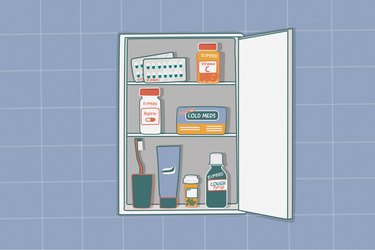
Maybe you feel a headache coming on at the end of a long day. Maybe you tweaked your back rearranging the living room furniture. Or perhaps you pushed yourself too far during your workout and now you're hurting.
Whatever the reason, you open your medicine cabinet and reach for a bottle of ibuprofen. But as you're twisting off the cap, you notice it expired last year.
Video of the Day
Video of the Day
Is it OK to take that over-the-counter (OTC) med past its "use by" date, or could doing so be harmful?
To find out, we looked at research addressing exactly this question — and talked to experts who live and breathe this stuff. Their insight might surprise you.
First, Consider the Safety Risks
Taking expired medicine can be risky, per the U.S. Food and Drug Administration (FDA). The issues include:
- It may not actually work: "If a drug has degraded, it might not provide the patient with the intended benefit because it has a lower strength than intended," according to the FDA. That is, expired medication may not be effective. That's particularly problematic with prescription medications; if they're not effective, you could be in danger.
- There could be side effects: That's due to the medication "yield[ing] toxic compounds," per the FDA.
It's best to safely dispose of all out-of-date medication, per the FDA.
How to Get Rid of Unwanted Medications
Don't throw expired or unused medications in the trash. Instead, follow these guidelines from the FDA.
- Bring the unwanted medications to a drop-off site or program.
- If medications are OK to flush down the toilet, go ahead and do so.
- For meds that shouldn't be flushed, crush the pills and mix them with unappealing garbage (like coffee grounds or cat litter), then place the mixture in the sealed plastic bag. Place that bag in the trash.
- For prescription medicine, remove any identifying information (such as your address) before disposing of the packaging.
Still, Expired OTC Meds May Help With Pain

Despite the risks, studies show that many meds, when carefully stored, remain potent well beyond their expiration date.
Let's back up and look at how expiration dates for over-the-counter medications are determined. "In order for a drug to be approved by the FDA, the manufacturer has to show that it will remain stable for up to three years," says pharmacist Lee Cantrell, professor of clinical pharmacy and director of the San Diego division of the California Poison Control System. "Because of that, most medicine has an expiration date that's a maximum of three years out."
Basically, a drug is guaranteed to retain its efficacy up until the expiration date.
"But that doesn't mean it goes bad after that," Cantrell says. "Since manufacturers only have to prove the product is effective for two or three years, there is no financial incentive for them to extend the expiration dates, even if the medicine remains potent for a longer period of time."
Case in point: Researchers examined 122 over-the-counter and prescription pharmaceuticals and found that, when stored properly in unopened containers, the meds remained stable for an average of 5.5 years past their expiration date — and some were still good after 20 years, per a July 2006 study in the Journal of Pharmaceutical Science. For example, this research found that acetaminophen (the generic version of Tylenol) can be extended at least 24 months after the "best by" date.
Furthermore, Cantrell analyzed eight different prescription meds in their original, sealed packaging that expired 28 to 40 years earlier. His team discovered that 12 of the 14 drug compounds tested were still potent, despite being decades old, per a November 2012 study in JAMA Internal Medicine.
But the meds used in this research were kept in an optimal environment, in never-before-opened containers. Is it a different story for unsealed bottles of pills?
"The stability and quality of expired medications varies greatly," Morton Tavel, MD, author of Health Tips, Myths, and Tricks: A Physician's Advice, tells LIVESTRONG.com. Even if no toxicities have been reported from using a certain expired drug, its efficacy can still be affected, Dr. Tavel says.
How to Extend the Shelf Life of Your OTC Medications
An important factor in a med’s potency is how it has been stored.
Humidity, exposure to direct sunlight and high temperatures contribute to degradation,” Cantrell says. Translation: Steer clear of the bathroom, where drugs will be exposed to heat and moisture.
Instead, stash medicine in a cool, dry place like a dresser drawer or a closet that's out of reach for children or pets, recommends the U.S. National Library of Medicine. Keep it in the original container, close the bottle tightly and toss the cotton ball, which can pull in moisture.
There May Actually Be Some Benefits to Taking Older OTC Meds
Aside from not having to make an extra trip to the store, you'll save money. Considering that a bottle of ibuprofen will run you $7.79 on average, acetaminophen is $4.27, cough suppressant is $8.06 and antihistamines are $30.87, tossing unused portions can add up.
Warning
One important exception: Always discard out-of-date aspirin, which degrades relatively quickly. “Aspirin pills break down into vinegar and salicylic acid [which] irritates the stomach," according to the U.S. National Library of Medicine.
"Americans could save billions of dollars if they used the same bottle of Advil, Tylenol or Benadryl for 10 to 15 years," Cantrell says. "This is just my take on it, but in that case, drug manufacturers would probably stop making these meds [since they wouldn't bring in enough profit]."
In addition, using expired OTC medication can have a positive environmental effect. Evidence of pharmaceutical contamination was found in water and sediment samples from Lake Michigan at concentrations of medium or high ecological risk, per a November 2013 study in Chemosphere.
"If longer shelf lives could reduce medication disposal, perhaps such a measure could also abate harmful environmental consequences," according to a November 2015 Mayo Clinic commentary.
So, How Bad Is It Really to Take Expired OTC Medicine?
Unless you're popping an ancient aspirin tablet, which might give you tummy trouble, you should be in the clear. Cantrell has worked in poison control for the past 25 years, and while he gets multiple calls a year from concerned people who accidentally took expired OTC medications, he has never had a single case of anyone experiencing an ill effect.
"That said, we don't really know, since there are no published studies showing that it is safe and effective," Cantrell says. "Anecdotally, I can tell you that I have tons of Tylenol that expired 10 years ago, and it works fine."
Still, depending on what the drugs are and how they were stored, old pills might not give you the results you want.
"Mild painkillers such as non-steroidal anti-inflammatory meds (NSAIDs) or antihistamines for nasal allergies can easily be monitored for efficacy," Dr. Tavel says.
In other words, if your skull is still throbbing after taking circa-2010 ibuprofen, it's probably time to stock up on a new supply. If your headache vanishes, then you're good to go.
Related Reading
- U.S. Food & Drug Administration: "Expiration Dates - Questions and Answers"
- FDA: "Disposal of Unused Medicines: What You Should Know"
- U.S. National Library of Medicine: "Storing your medicines"
- Journal of Pharmaceutical Science: "Stability Profiles of Drug Products Extended Beyond Labeled Expiration Dates"
- JAMA Internal Medicine: "Stability of Active Ingredients in Long-Expired Prescription Medications"
- Mayo Clinic: "Extending Shelf Life Just Makes Sense"
- Chemosphere: "Pharmaceuticals and personal care products found in the Great Lakes above concentrations of environmental concern"
- FDA: "Drug Disposal: Dispose "Non-Flush List" Medicine in Trash"
- FDA: "Drug Disposal: Flush Potentially Dangerous Medicine"
- GoodRx: "Advil, Motrin IB Ibuprofen Non-Prescription"
- GoodRx: "Tylenol, Mapap, Q-Pap Acetaminophen"
- GoodRx: "Robitussin"
- GoodRx: "Loratadine / Pseudoephedrine"
Is this an emergency? If you are experiencing serious medical symptoms, please see the National Library of Medicine’s list of signs you need emergency medical attention or call 911.
